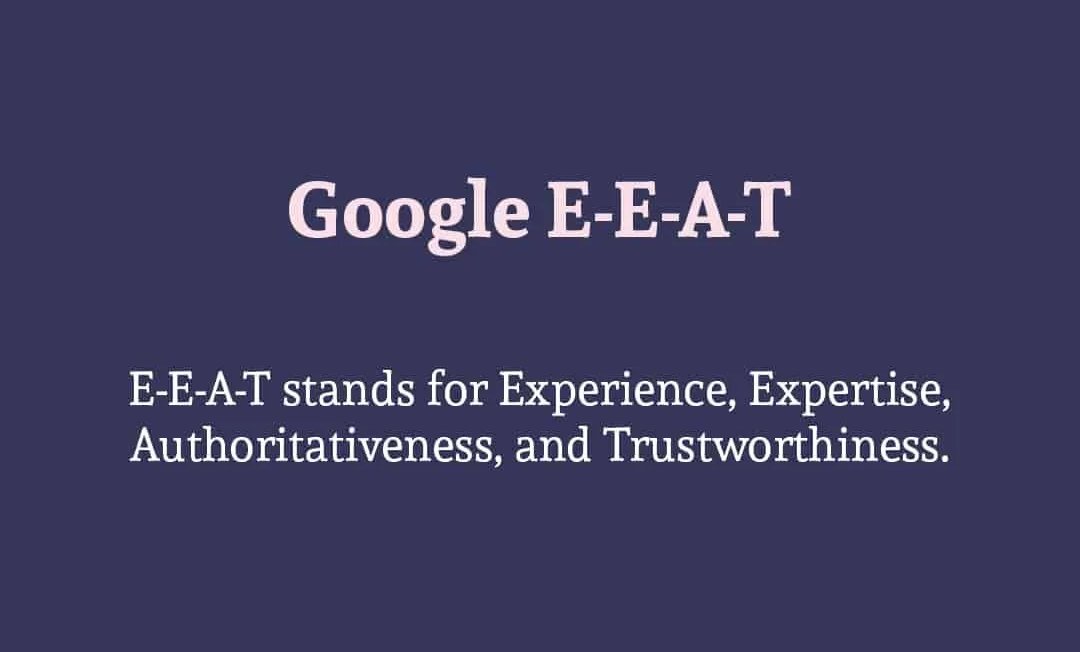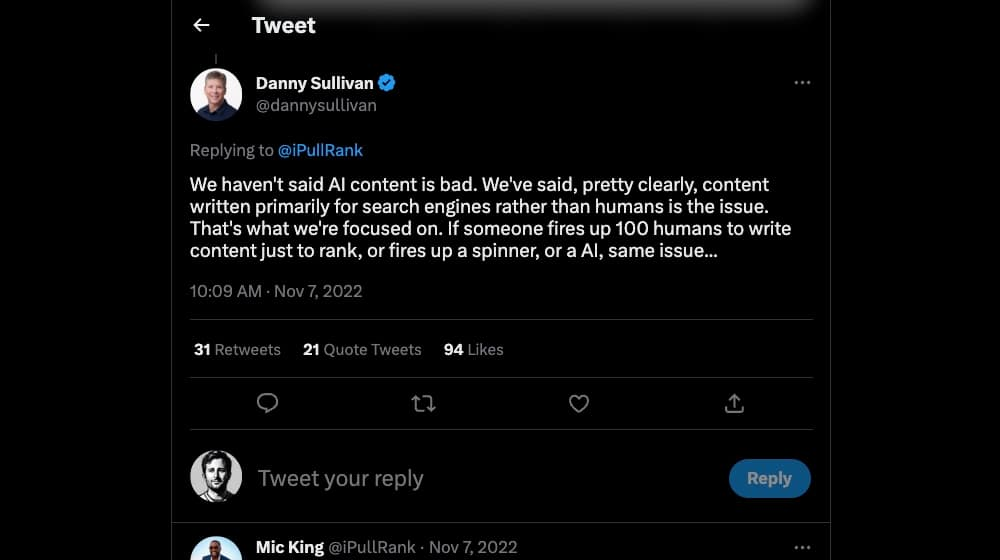Table of Contents
Google E-E-A-T stands for Expertise, Authoritativeness, and Trustworthiness, and it is an important concept in SEO. To use E-A-T in SEO, you should focus on creating high-quality, authoritative content that demonstrates your expertise in your field. This can be achieved by providing accurate and well-researched information, citing credible sources, and building trust with your audience. Additionally, you should also work on building your authority and credibility through backlinks, social proof, and positive reviews. By incorporating E-A-T principles into your SEO strategy, you can improve your website’s visibility and credibility in the eyes of search engines and users.
What is the Google E-E-A-T in SEO?

E-E-A-T stands for Experience, Expertise, Authoritativeness, and Trustworthiness. It is a framework used in SEO (Search Engine Optimization) to evaluate the quality and credibility of online content. This framework helps search engines determine the reliability and expertise of a website’s content, which can impact its ranking in search results. It emphasizes the importance of providing valuable and trustworthy information to users.
Experience : “Experience” refers to demonstrating relevant expertise and knowledge through the content you create. This is important because it helps to establish trust with your audience. For example, if a health article is written by a qualified doctor, it adds credibility and the reader is more likely to trust the information presented.
Expertise : Expertise refers to the demonstration of specialized knowledge in a particular field or industry. It indicates a deep understanding and mastery of the subject matter, which in turn enhances the credibility of the content and establishes the author as a reliable source of information.
Authoritativeness : Authoritativeness refers to establishing oneself as an expert in a specific field. When a person is recognized as an authority and has a strong reputation, it can have a significant impact on their rankings in search engines. This signals to search engines that the content is trustworthy and valuable, which can positively affect its visibility and ranking.
Trustworthiness : Trust is crucial for a reader because it gives confidence to both search engines and users. When content is consistently reliable and honest, it builds trust with the audience and search engines, which ultimately leads to better online visibility.
History of E-E-A-T
The development of EEAT from EAT is an intriguing narrative about Google’s continual endeavor to provide the best possible search results. Google maintained a chronology for all upgrades. Here it goes like this:
March 2013 : Google officially published its Search Quality Rating Guidelines, which outline the criteria used by human raters to evaluate page quality. Initially, these search quality rater rules incorporated the notion of “EAT” (Expertise, Authoritativeness, and Trustworthiness) as one of the criteria for assessing YMYL content (Your Money, Your Life) websites.
August 2018 : Google confirmed a major upgrade that prioritizes EAT. This upgrade is often regarded as signaling a trend toward material displaying greater knowledge, authoritativeness, and reliability.
December 2022 : Google launches “EEAT” with an additional “E” for “Experience.” This update represents a more in-depth understanding of expertise, including the value of direct experience and practical knowledge gained via material.
How Google’s Quality Ratings Assess E-E-A-T
Google Search incorporates a few criteria while calculating the E-E-A-T score. According to these parameters, it is classified as Lowest, Lacking, or High-level EEAT.
Lowest E-E-A-T
Content with low E-E-A-T sometimes lacks clear authorship or appropriate qualifications, delivering information without supporting sources or expertise. The causes for having low EEAT might include Outdated, incorrect, or even deceptive material. Insufficient depth or authority in the subject matter.
Lacking E-E-A-T
The absence of E-E-A-T in the material may result in ambiguity or inadequate credibility signals. The reasons might be:
Content may not fully demonstrate the author’s competence or experience in the topic.
The author’s bio or profile has not been updated with current qualifications or certifications.
High-Level E.E.A.T
Several good characteristics distinguish the High Level of E-E-A-T. It indicates unambiguous and authoritative authorship, as evidenced by applicable qualifications and competence. This material provides reliable, up-to-date information from credible sources, as well as complete insights tailored to user purpose. High E-E-A-T content ranks well in search engines owing to its perceived trustworthiness, credibility, and relevancy.
This material provides reliable, up-to-date information from credible sources, as well as complete insights tailored to user purpose.
High E-E-A-T content ranks well in search engines owing to its perceived trustworthiness, credibility, and relevancy.
E-A-T Effect on SEO
Although e-e-a-t is not a direct ranking criteria, sites with high E-E-A-T scores are 2.5 times more likely to appear on Google’s first page for YMYL themes. (Source: Bright edge’s 2023 Local SEO Study)
Backlinko discovered that the average domain authority of the top ten websites for YMYL keywords is much greater than for non-YMYL keywords. This indicates a significant relationship between E-E-A-T and authority. (Source: Backlinko, 2023 YMYL SEO Study).
How to Use E-E-A-T to Grow your Ranking : While E-E-A-T is not a direct SEO ranking criteria, like backlinks or page speed, it has a significant impact on how search engines assess and rank content.
Here’s how E-E-A-T affects the equation: Signal Quality and Relevance: A seasoned author with a demonstrated track record in the subject indicates dependable and trustworthy information. This tells search engines that the information is coming from an industry expert and that the data and statistics given are correct. Through research, citations, and insightful analysis, you may demonstrate your expertise, firsthand experience, and grasp of the issue, therefore increasing trust and authority. This notifies search engines that the information is likely to be reliable and informative.
Being acknowledged as a thought leader or reliable authority in your profession generates backlinks and mentions from other respectable websites. This serves as a vote of confidence to search engines, increasing the content’s ranking potential. Maintain a clear and ethical approach to content generation while fostering user trust. This indicates to search engines that the information is trustworthy and unbiased, increasing the likelihood that it will rank highly for the YMYL topic.
Indirectly Influences Other Ranking Factors : E-E-A-T promotes well-researched, accurate, and intelligent information. This naturally leads to increased user engagement and happiness, which are both excellent signs for search engines. High-quality material from an authoritative source is more likely to generate backlinks from other credible websites. This improves the website’s total authority and domain rating, hence increasing its ranking potential.
Trustworthy content automatically results in more shares, comments, and longer dwell times. This indicates to search engines that consumers value the information, enhancing its ranking potential.
SEO Tips for Achieving Highest E-E-A-T : Building E-E-A-T for a topic is a continuous process with search engines, however, these tips can help you achieve top results:
- Create attention-grabbing content
- Research, research, research! Go beyond surface-level summaries to provide critical analysis, various views, and unique information. Also, include reputable references and facts to back up your claims.
- The additional E in E-E-A-T stands for “experience”. Therefore, enrich your material with your own expertise and experience. Share case studies, personal experiences, and practical recommendations that demonstrate your understanding of the subject.
- Create material that is both accessible and entertaining for your target audience. Avoid using jargon, complicated phrase patterns, and unnecessary technical words. Remember that clarity reigns supreme.
- Integrate narrative into your content and SEO. Keep the language NLP (Natural Language Processing) – employ simple language that flows like a human conversation, rather than a robot writing. To break up language and make it more reader-friendly, add images, examples, and comedy.
Highlight your Expertise : Make your “About Us” page a mini-encyclopedia of your team’s qualifications. Highlight your qualifications, accolades, and industry experience with statistics. Include photographs in the biographies, as well as links to personal LinkedIn pages. Contribute to high-authority websites in your niche. This not only demonstrates competence but also generates significant backlinks and enhances your online reputation. Actively participate in social networking networks such as LinkedIn, Instagram, and Twitter (X), whatever is most relevant to your industry. Share thoughts, participate in debates, and respond to user inquiries. This establishes you as a thinking leader and increases trust.
Obtain Quality Backlinks (Not Quantity)
Create evergreen content that will automatically draw backlinks from respectable websites or those with high domain authority. Provide insightful research, original facts, or practical suggestions that people can’t stop mentioning in their work.
Do not spam! Identify relevant websites with broken links or obsolete material, and provide high-quality alternatives.
Collaborate with a professional content producer in your sector on collaborative projects or co-authored pieces. This can result in cross-promotion and backlinks from several important sources.
Behind the Tips
- E-E-A-T is not static. Keep track of changing search engine algorithms and industry trends so that you may adjust your content strategy properly.
- Transparency and honesty can boost your E.E.A-T. Disclose affiliations, prevent plagiarism, and thoroughly fact-check each assertion.
- Respond to comments, inquiries, and concerns in a timely manner. This promotes a positive internet reputation and increases user trust.
What About E-E-A-T in the AI world?

Google is seeking a balanced and thoughtful approach to content generated by artificial intelligence. Many websites are producing large amounts of content using AI on a daily basis. Although Google has cautioned against publishing AI-generated content without human supervision, they have not completely banned its use.
According to Danny Sullivan from Google, content created using artificial intelligence (AI) is acceptable as long as it is reviewed and approved by a human editor and goes through thorough fact-checking. This means that AI content also needs to demonstrate expertise, authoritativeness, and trustworthiness (E-A-T) in order to rank higher on search engines.
Can ChatGPT Content Support E-E-A-T Standards?
“Can ChatGPT content provide E-A-T standards?” relates to whether the material created by ChatGPT meets the E-A-T requirements, which stand for Expertise, Authoritativeness, and Trustworthiness. This is a set of quality guidelines outlined by Google for assessing the credibility of web content. As for whether ChatGPT can provide E-A-T standards, it’s important to note that while ChatGPT can generate content, it’s ultimately up to the user to ensure that the content meets these standards.
Potential Advantages of ChatGPT : Efficiency: ChatGPT generates enormous volumes of material fast, saving time and resources. This can assist develop ideas, structure material, or build drafts that adhere to Google’s search quality requirements.
Grammar and fluency : ChatGPT excels in producing grammatically accurate and fluid prose, ensuring that content signals are reader-friendly. Google values amusing and engaging content, which improves the user experience and attracts more readers.
Limitations of ChatGPT for EEAT : ChatGPT material might occasionally be lacking in depth and originality because it is mostly based on training data. This might make it difficult to demonstrate actual competence on a particular issue.
Factual accuracy : While ChatGPT is typically accurate, it can produce erroneous or misleading information, particularly on difficult or esoteric issues. Careful fact-checking is essential.
Transparency and citation : ChatGPT does not automatically offer citations or sources for its content, which is critical for the site’s credibility, making it impossible to check its claims and judge its reliability.
Here are a Few Tips for Utilizing ChatGPT Responsibly :
- Focus on well-researched themes: Choose areas in which you have prior experience or can quickly perform extensive study. Once you have your material ready, modify it based on your experience presenting e-e-a-t to Google.
- Fact-check and edit carefully: Use Google to check the content’s correctness before publishing. High-e-a-t websites usually prioritize data in their SEO efforts.
- Cite sources and attribute data: Bring emphasis to Google’s source of information, even if it is not directly quoted.
- Supplement with human expertise. Combine ChatGPT information with Google’s desired insights and analysis to enhance depth and authority.
- If you employ ChatGPT wisely, your material can achieve an adequate degree of e-a-t. However, human knowledge and oversight remain critical for establishing true trust and authority online.
Why Should you Prioritize E-E-A-T in your SEO Strategy?
- Focusing on E-E-A-T is more than simply ranking; it’s about establishing trust with your audience and search engines. Investing in high-quality content and building your online reputation will help you achieve long-term SEO success.
- Apply the advice provided to shift your technical SEO approach from ranking algorithms to developing true trust and authority.
Remember: E-E-A-T is a journey, not a destination. Stay up to date on potential Google algorithm adjustments and stick to your content for strong e-e-a-t.
Contact us if you need more information or have any queries about SEO or content optimization. We would be delighted to serve you!



